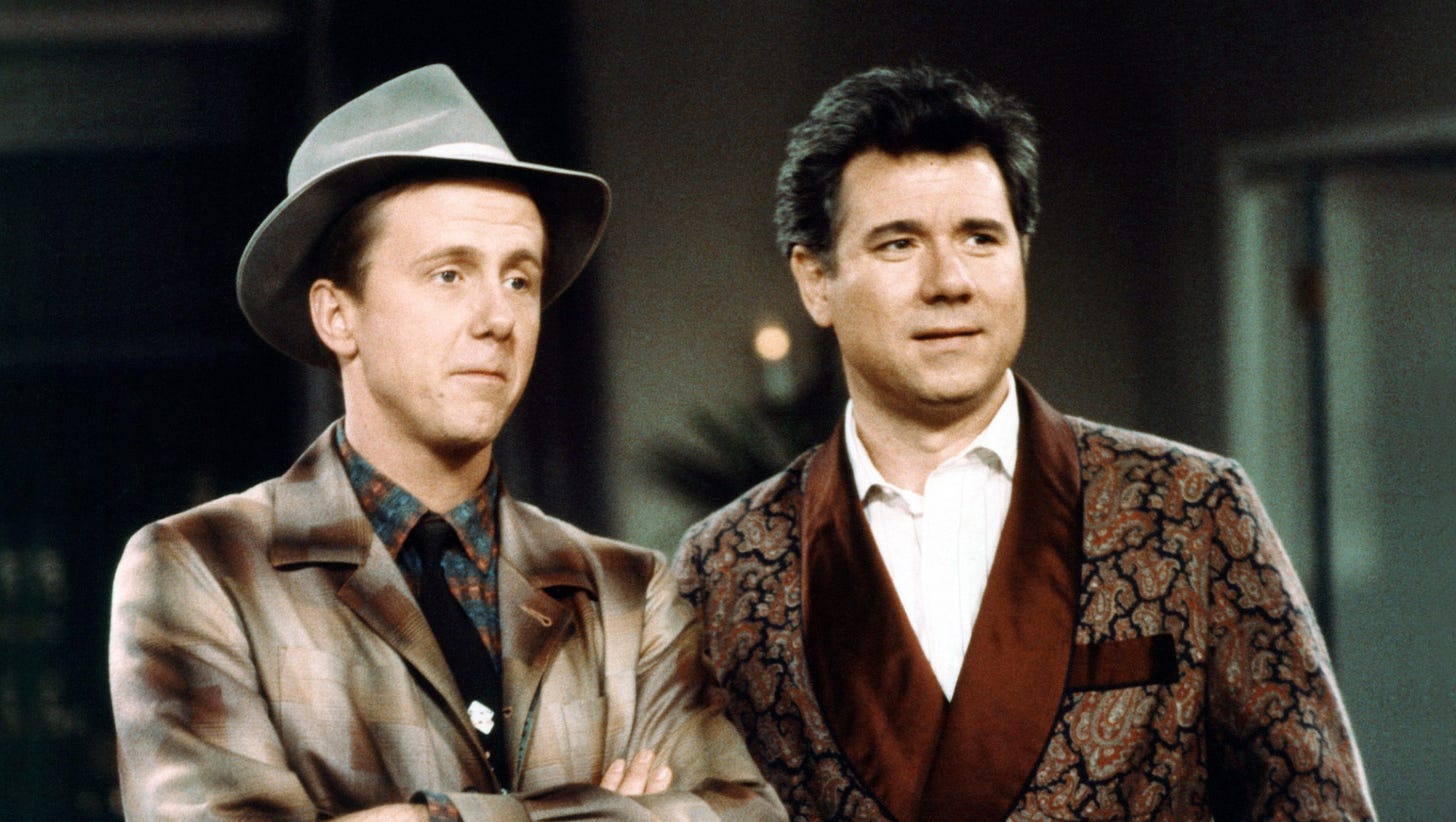All the Lonely People
Exploring the root of our deep-seated need to be understood.
Image: Judge Harry Stone and Attorney Dan Fielding of Night Court: farrelog.blogspot.com
Odd 80s Sitcoms
One of the weird features of the 80s sitcom genre was the propensity of the writers (who generally churned out lowbrow slapstick) to suddenly throw in a surprisingly serious episode. The ratio seemed to be about 97% mindless banter between predictable but lovable characters who get caught up in all kinds of comedic hijinx and the remaining 3% that hit us Gen Xers like a screwball between the eyes.
There are many examples, but I’m thinking specifically of Dan Fielding of Night Court—a saucy and arrogant prosecutorial lawyer who was fond of bragging about his conquests of den mothers and his frequent trysts with the local dominatrix. But in 1985’s episode “Married Alive,” Dan falls for an ugly duckling heiress with an annoying high-pitched voice. Everybody assumes Dan is scamming her for her money, but then, uncharacteristically, he shares a piece of his soul:
But when we’re alone, I feel good, very good. Relaxed, wanted, and accepted. You know that crazy stuff that we all carry around inside of us? That stuff that eats little holes in your brain and churns at your insides? That stuff that you know you cannot possibly tell another living human being. I can tell her. And she listens. And she understands. And she says it’s all right.
Whoa.
I saw this episode exactly once, 38 years ago, and it is still making an impression on me. Why? Because it so forcefully underscored our primal human need to be understood. It is such a powerful motivator that it overrides many other significant aspects of our lives. So to all of those people who say, “I couldn't care less what people think of me,” I say, we all know that’s a bunch of hooey. That’s the primary thing that you care about.
Awfulness at the Office
It’s no secret that people need to feel valued (understood) in work situations and that they are generally happier at a lower-paying job with appreciation than a high paying one without. “There’s nothing worse than feeling unseen and unheard in the workplace,” says Annie McKee, author of How to Be Happy at Work. “We all have a human need to be appreciated for our efforts, and so when your colleagues don’t notice [your contributions], it makes you feel as though you don’t belong.”
Artists have this need particularly badly and are especially exposed in this regard. While reaching higher and risking more than others, artists tend to need to be heard and understood more than others. Here’s what musician, artist, and Beyond Belief contributor Peter Himmelman had to say about it.
If I were selling Firestone tires, for example, it would be so much easier than selling the wares of my inner life. If someone doesn’t like the tires I’m selling, so big deal. I don’t make them, and therefore, I’m not attached to them. Unlike with tires, when someone says they don’t like the music I write, it can, on some deep level, make me feel like my essential self has been rejected. Don’t think that just because I care about people’s opinions, it means that I’m writing songs just to score points. Quite the opposite, if I’ve written what I passionately feel, my whole being will be on the line!
Yep.
Image: Jodi Foster, the associated press
I want to be seen
Or take a look at what Jodi Foster had to say on the occasion of winning the Cecil B. DeMille Award at the Golden Globes (in conjunction with her 50th birthday):
"Well, I may never be up on this stage again, on any stage for that matter. Change, you gotta love it. I will continue to tell stories, to move people by being moved, the greatest job in the world. It's just that from now on, I may be holding a different talking stick. And maybe it won't be as sparkly; maybe it won't open on 3,000 screens; maybe it will be so quiet and delicate that only dogs can hear it whistle. But it will be my writing on the wall. Jodie Foster was here, I still am, and I want to be seen, to be understood deeply, and to be not so very lonely. Thank you, all of you, for the company. Here's to the next 50 years."
To not be so very lonely?! What does she even mean? She’s Jodi Foster and can have anything in this world that she wants, can’t she? Apparently not. In the summation of her speech on a legacy birthday that capped a brilliant and successful career, what is it that she most wants? To be understood…”deeply.”
Stunning.
Deep down, most of us have an intrinsic sense of our own value. We know that we have so much to offer and often wonder, “Why can’t people see it?” Why do my kids not seem to understand how much I’ve done for them? Why does my spouse never compliment me? Why aren’t my words taken more seriously when the less meaningful words of others seem to receive so much adulation? This is the loneliness of the soul itself. Our essence is like a Titan Rocket engine that has been strapped to a Dodge Dart. It’s desperate to move but just can’t, given its physical constraints.
What’s it all about?
So why do we have this drive for acceptance and validation? Unless you’re one of those rare loners who lives in a cabin in northern Saskatchewan, everything we do involves other humans—who are simultaneously the source of our greatest pain and our greatest joy. The joy of friendship, parenthood, and romantic love all grow from the discovery of common ground—you feel what I do. In that moment, we are able to take leave of the fundamental isolation of our own minds and genuinely (if temporarily) merge with an “other” who, somehow, miraculously, resembles us. We see that we are not alone, and we experience this true companionship rapturously.
Carl Jung said, “Loneliness does not come from having no people about one, but from being unable to communicate the things that seem important to oneself, or from holding certain views which others find inadmissible.” It’s not for lack of other humans that we’re lonely; it’s rather our limited ability to convey the profound essence of who and what we really are—the primordial thing that we are most intimately familiar with but can’t express. We do try, though, in songs and poems, in marriages, friendships (and blog posts). If you think about it, you’ll see that your friends are the people with whom you’ve most naturally connected with in this way. They get you. And like attorney Dan Fielding discovered, even a fleeting moment of this genuine connection is worth the whole world.






Thank you for the article titled All the Lonely People.
It struck a cord right in my soul.
I relate, I relate.